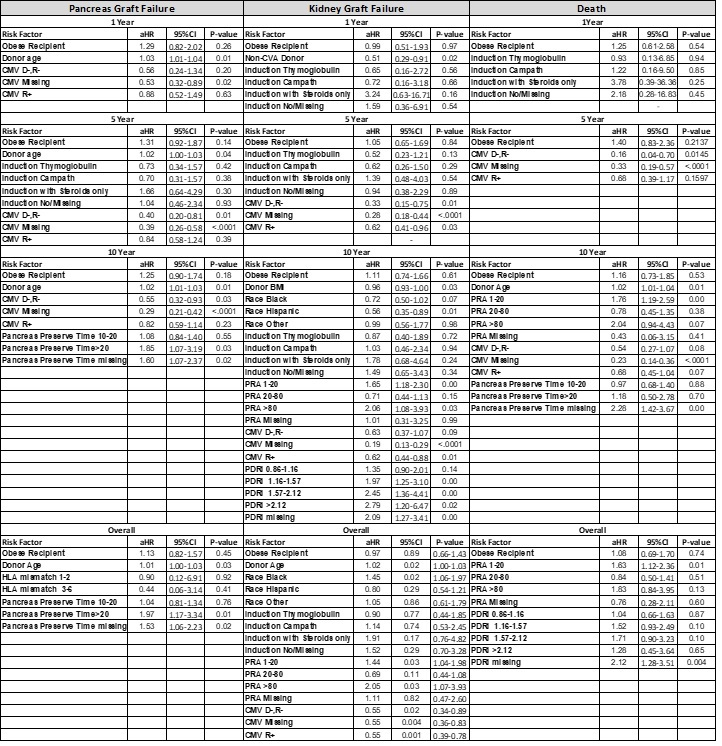Outcomes in Obese Patients with Diabetes Mellitus Type 2 That Received Simultaneous Pancreas and Kidney Transplant
1Washington University, Saint Louis, MO, 2Washington University in St Louis, Chesterfield, MO, 3Washington U, St Louis, MO, 4Wash U, St Louis, MO, 5Washington University in St. Louis School of Medicine, Saint Louis, MO, 6SLU, St Louis, MO, 7Washington University School of Medicine, Saint Louis, MO, 8Surgery, Washington University School of Medicine, Saint Louis, MO, 9Washington University School of Medicine at St. Louis, Saint Louis, MO
Meeting: 2022 American Transplant Congress
Abstract number: 429
Keywords: Prognosis
Topic: Clinical Science » Pancreas » 65 - Pancreas and Islet: All Topics
Session Information
Session Name: Pancreas and Islet: All Topics
Session Type: Rapid Fire Oral Abstract
Date: Tuesday, June 7, 2022
Session Time: 3:30pm-5:00pm
 Presentation Time: 3:50pm-4:00pm
Presentation Time: 3:50pm-4:00pm
Location: Hynes Room 210
*Purpose: Simultaneous pancreas and kidney transplant (SPKT) has excellent outcomes in patients with end stage renal disease secondary to diabetes mellitus type 2 (DMT2). The outcome of SPKT in DMT2 obese recipients with BMI >30 kg/m2 has not been well studied.
*Methods: We reviewed Organ Procurement and Transplantation Network (OPTN) data that had SPKT for DM Type 2 between 1/1/2000 and 6/12/2020. Patients aged <18 years, Body Mass Index (BMI) <20 kg/m2 and ≥35 kg/m2, prior transplants and donors after cardiac death were excluded. Obesity was defined as having a BMI between the ranges 30.0-35.0 kg/m2 and lean recipients with BMI 20.0-30.0 kg/m2 The outcomes were kidney and pancreas graft loss and death at post-SPKT 1, 5, 10 years, and the entire follow-up. The association of obesity with each outcome was analyzed using multivariable Cox regression including adjustment for recipient, donor, and transplant characteristics (Table 1).
*Results: A total of 1,311 SPKT with DM Type 2 were analyzed. Among them, 190 (14.5%) recipients were obese. Obesity in SPKT with DM type 2 did not increase the risk of kidney or pancreas allograft failure (multivariable-adjusted hazard ratio, aHR=0.97, 95% confidence interval, CI [0.66-1.43]; aHR=1.13 95%CI [0.82-1.57]). Similar results were observed at 1, 5 and 10 years (Table1). Similarly, obesity was not associated with an increased risk for death aHR=0.97, 95%CI [0.66-1.43] at all follow-up time points.
*Conclusions: SPKT recipients with obesity and DM Type 2 were not at increased risk of death and kidney or pancreas allograft failure. This study encourages many centers to not exclude patients with DM Type 2 with obesity for SPKT, which can benefit survival and decrease DM complications.
To cite this abstract in AMA style:
Merzkani M, Murad H, Wang M, Hu V, Ji M, Al-Hosni Y, Alzahabi O, Zayed M, Lentine K, Wellen J, Chang S, Alhamad T. Outcomes in Obese Patients with Diabetes Mellitus Type 2 That Received Simultaneous Pancreas and Kidney Transplant [abstract]. Am J Transplant. 2022; 22 (suppl 3). https://atcmeetingabstracts.com/abstract/outcomes-in-obese-patients-with-diabetes-mellitus-type-2-that-received-simultaneous-pancreas-and-kidney-transplant/. Accessed February 27, 2026.« Back to 2022 American Transplant Congress

